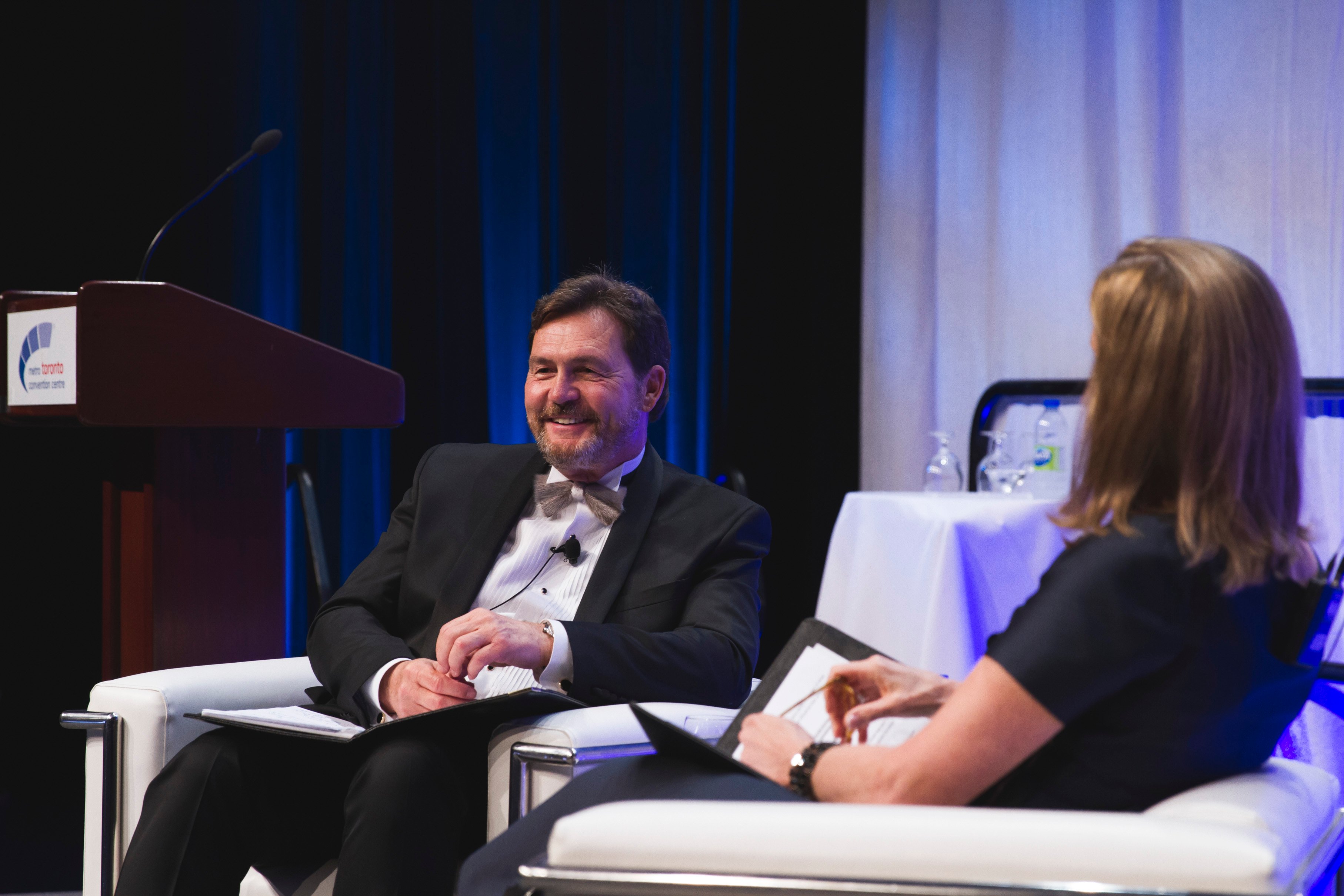The Advocates’ Society’s annual End of Term dinner, held last night in Toronto, marked the first time that journalists had been invited — and fittingly, perhaps, as the guest of honour was new Supreme Court Chief Justice Richard Wagner, who has prioritized connecting with the public and making the law more accessible to Canadians.

The Advocates’ Society’s annual End of Term dinner, held last night in Toronto, marked the first time that journalists had been invited — and fittingly, perhaps, as the guest of honour was new Supreme Court Chief Justice Richard Wagner, who has prioritized connecting with the public and making the law more accessible to Canadians.
The Advocates’ Society incoming president Brian Gover, of Stockwoods LLP in Toronto, welcomed Chief Justice Wagner, who was interviewed in an informal Q&A by Justice Michal Fairburn of the Court of Appeal for Ontario. Fairburn’s questions to him ran the gamut from his Montreal childhood to his favourite sports to the recognition of Canada’s judicial system around the world.
Canadians take for granted democracy, the rule of law and freedom of expression, Wagner said. However, he added, “We should not take it for granted” but must work to maintain it. An estimated 45 per cent of Canadians take their news from social media, he said, but “we need traditional media” as well for information. And, he noted that the Supreme Court “must find ways to communicate directly with the public.”
One of Wagner’s first initiatives after being appointed Chief Justice of Canada in December was to release summaries (“Case in Brief”) of legal decisions, written in laypeople’s language, along with the full reasons in appeals when they are posted to the Supreme Court of Canada’s website.
“We decided to find a way to communicate better . . . to allow people to understand” decisions, Wagner told Fairburn. In addition, the Supreme Court will continue to hold an annual event to talk to the media, issue a statement from the court’s judges each year at Christmas and visit a city in Canada to hold an annual retreat, which will include meeting with local judiciary, law faculty and citizenry, he said. In 2018, that city will be Winnipeg, where Wagner suggested that Supreme Court justices may even sit with the local judges.
Citizens also “have the right to a shorter process,” he said of the judicial process and its need for reform. Yet, Wagner added, Canada’s judiciary “is probably the best trained in the world," and, he said, when he visited European and other nations, “the judges look to you. . . . We are not a great economic or military power, but we are a power for the rule of law.” At the same time, we must work to maintain that, he said.
As for what makes the best kind of advocate, Wagner — who first appeared before the Supreme Court in 1983, at age 26, when he was a partner at Lavery de Billy in Montreal — said the best advocates will choose their battles carefully, concentrating on one issue that they want to win in a legal fight.
And the law aside, Fairburn wanted to know Wagner’s favourite sports (he loves golf, but he doesn’t have time to play much anymore), and about his bow tie: It was made of sealskin. Wagner said that after he had joined the Supreme Court as a puisne judge in 2012, he had noticed then-SCC justice Thomas Cromwell sporting the tie, which the latter dubbed a “chick magnet.” (Later, Cromwell made a gift of the tie to Wagner.)
The light-hearted mood of the evening extended to the estimated 1,300 attendees from across the country tweeting from the gala under the hashtags #LawProm and #overtogover (or #Over2Gover). The latter was used for a Twitter contest in which attendees took selfies holding up a cardboard cut-out of new Advocates’ Society president Brian Gover’s face (the prize was snagged by Julia Lefebvre from Bersenas Jacobsen Chouest Thomson Blackburn LLP, who took home an iPad mini for her trouble. Gover’s own law firm tweeted a pic of him flanked by two of the cut-outs and the caption “It’s like this every day here”).
Last night’s dinner marked The Advocates’ Society’s 55th anniversary. Scott Maidment, from McMillan LLP in Toronto, became the new vice president. Award winners were Evan Thomas of Osler Hoskin & Harcourt LLP, for the David Stockwood Memorial Prize; Tom Curry of Lenczner Slaght Royce Smith Griffin LLP, for the Excellence in Teaching award; and Marlys Edwardh of Sack Goldblatt Mitchell LLP, who took the prized Award of Justice for her career in litigation, notably in criminal law and civil rights, which has spanned more than four decades.
“In my early years, the work of breathing life into the Charter of Rights and Freedoms went hand in hand with the paradigm shift which occurred because of the deeply disturbing phenomenon of the high-profile wrongful convictions of Marshall, Milgaard, Morin, Sophonow, Truscott and others,” Edwardh said in her acceptance speech.
“We now know that the criminal justice system can suffer from very serious frailties,” she continued. “Investigative techniques, forensic science, expert witnesses and procedural provisions cannot now be presumed to promote the conviction of only the guilty. They must continue to be tested and challenged against the standard of protecting the innocent.”










